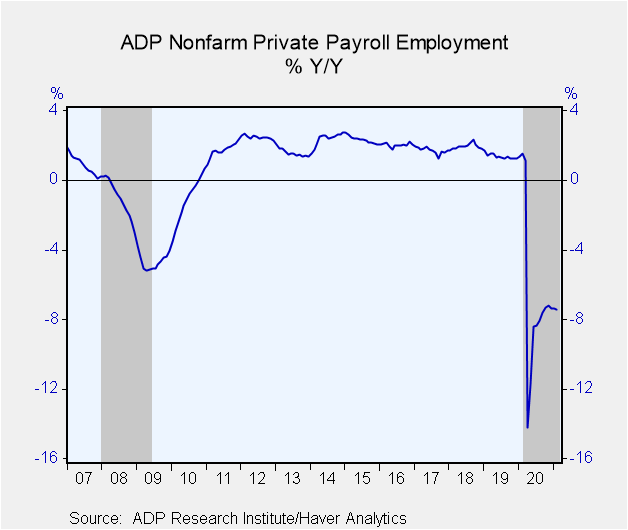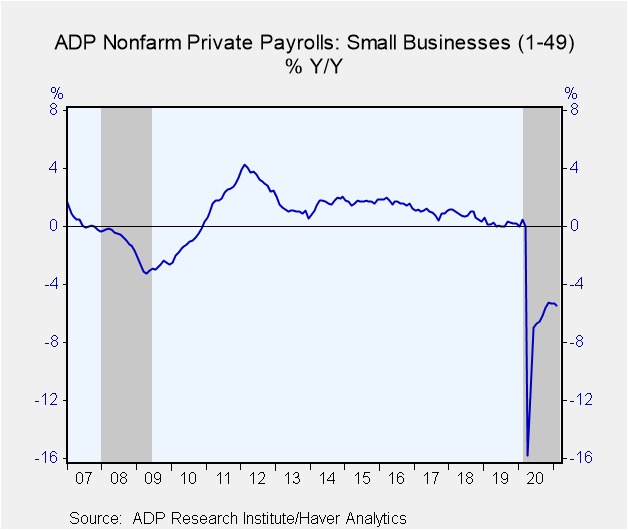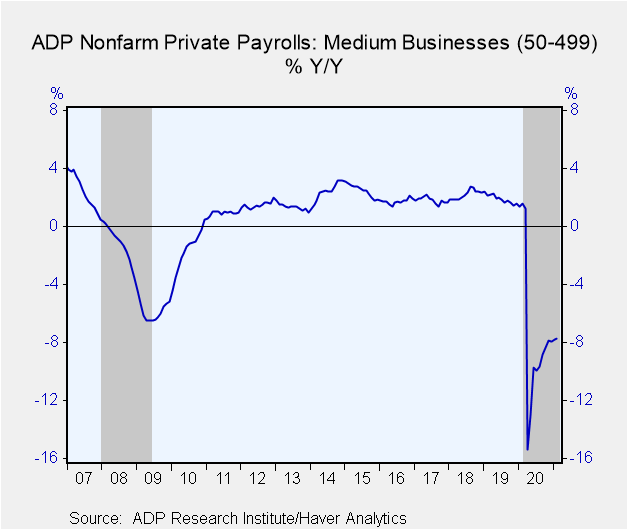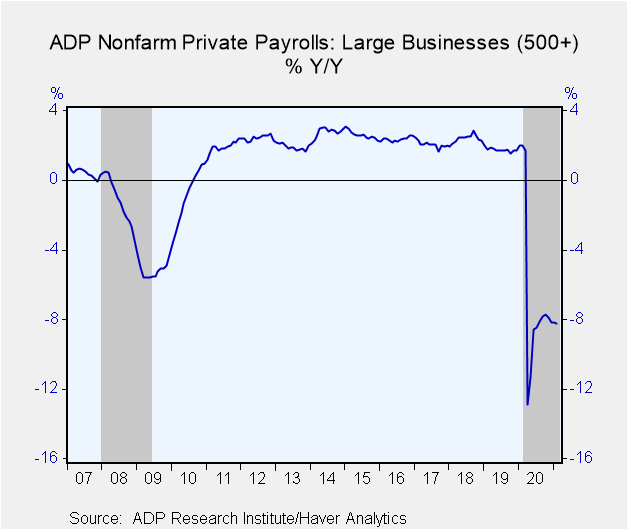 Global| Mar 03 2021
Global| Mar 03 2021U.S. ADP Nonfarm Private Payroll Increase Disappoints in February
by:Tom Moeller
|in:Economy in Brief
Summary
• Modest job increase follows upwardly revised January reading. • Reduced growth is broad-based amongst payroll sizes. • Factory workforce size declines. Job market strength moderated last month. The ADP National Employment Report [...]
• Modest job increase follows upwardly revised January reading.
• Reduced growth is broad-based amongst payroll sizes.
• Factory workforce size declines.
Job market strength moderated last month. The ADP National Employment Report indicated that nonfarm private sector payrolls increased 117,000 (-7.4% y/y) during February after rising 195,000 in January, revised from 174,000. December's change was revised to -75,000 from -78,000. A 200,000 February rise had been expected in the Action Economics Forecast Survey. The ADP report is based on survey data through February 12.
Medium-sized payrolls increased 57,000 (-7.8% y/y) last month following an 89,000 January rise, revised from 84,000. Small-sized payrolls improved 32,000 (-5.4% y/y) after gaining 55,000 in January, revised from 51,000. Large-sized payrolls increased 28,000 in February (-8.3% y/y) after January's 51,000 rise, revised from 39,000.
Within industry sectors, private service employment increased 131,000 (-8.1% y/y) after a 178,000 rise, revised from 156,000. Jobs in trade, transportation & utilities rose 48,000 (-5.1% y/y) after rising 14,000 in January. A 22,000 rise (-6.0% y/y) in the number of professional business services jobs extended their steady monthly job gain since May. The number of education & health services jobs rose 35,000 (-4.2% y/y) and have risen in each month since May. A 26,000 rise (-23.8% y/y) in leisure & hospitality hiring followed a 50,000 January gain. Jobs in financial services held steady (-1.8% y/y) after increasing 3,000 during each of the prior two months. The number of information sector jobs eased 3,000 (-10.6% y/y), down for the fourth straight month.
Employment amongst goods-producing firms weakened 14,000 (-4.1% y/y) after rising 17,000 in January, revised from 19,000. The number of factory sector jobs fell 14,000 last month (-4.6% y/y) after gaining 8,000. The size of construction sector payrolls eased 3,000 (-2.9% y/y) following an 8,000 increase. Employment in the natural resource & mining sector improved 3,000 in February (-9.1% y/y) after holding steady during each of the prior two months.
The Automatic Data Processing Research Institute survey covers 411,000 companies and includes about one-fifth of U.S. private payroll employment. The data are processed by Moody's Analytics Inc., then calibrated and aligned with the BLS establishment survey data. The ADP data cover private sector employment only.
The ADP National Employment Report data can be found in Haver's USECON database. Historical figures date back to 2001 for private employment and the industry breakdown, and 2005 for the business size breakout. The expectation figure is available in Haver's AS1REPNA database.
Lessons from History, Policy for Today from Mary C. Daly, President & CEO Federal Reserve Bank of San Francisco is available here.
| ADP/Moody's National Employment Report | Feb | Jan | Dec | Feb Y/Y % | 2020 | 2019 | 2018 |
|---|---|---|---|---|---|---|---|
| Nonfarm Private Payroll Employment (m/m chg, 000s) | 117 | 195 | -75 | -7.4 | -6.4 | 1.4 | 1.9 |
| Small Payroll (1-49) | 32 | 55 | -8 | -5.4 | -5.8 | 0.2 | 0.8 |
| Medium Payroll (50-499) | 57 | 89 | 49 | -7.8 | -7.2 | 1.9 | 2.2 |
| Large Payroll (>500) | 28 | 51 | -116 | -8.3 | -6.3 | 1.7 | 2.4 |
| Goods-Producing | -14 | 17 | -5 | -4.1 | -4.1 | 1.5 | 3.0 |
| Construction | -3 | 8 | 9 | -2.9 | -2.5 | 2.5 | 4.4 |
| Manufacturing | -14 | 8 | -14 | -4.6 | -4.7 | 1.0 | 2.1 |
| Service-Producing | 131 | 178 | -71 | -8.1 | -6.8 | 1.3 | 1.7 |
Tom Moeller
AuthorMore in Author Profile »Prior to joining Haver Analytics in 2000, Mr. Moeller worked as the Economist at Chancellor Capital Management from 1985 to 1999. There, he developed comprehensive economic forecasts and interpreted economic data for equity and fixed income portfolio managers. Also at Chancellor, Mr. Moeller worked as an equity analyst and was responsible for researching and rating companies in the economically sensitive automobile and housing industries for investment in Chancellor’s equity portfolio. Prior to joining Chancellor, Mr. Moeller was an Economist at Citibank from 1979 to 1984. He also analyzed pricing behavior in the metals industry for the Council on Wage and Price Stability in Washington, D.C. In 1999, Mr. Moeller received the award for most accurate forecast from the Forecasters' Club of New York. From 1990 to 1992 he was President of the New York Association for Business Economists. Mr. Moeller earned an M.B.A. in Finance from Fordham University, where he graduated in 1987. He holds a Bachelor of Arts in Economics from George Washington University.
More Economy in Brief
 Global| Feb 05 2026
Global| Feb 05 2026Charts of the Week: Balanced Policy, Resilient Data and AI Narratives
by:Andrew Cates










